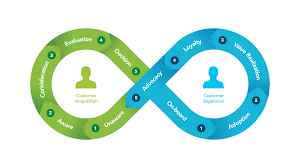Which Loop Is More Iterative in Nature?
Short answer: HubSpot’s Loop is explicitly iterative—and Pedowitz’s Loop Methodology increases the cadence with governed experiments and a shared scorecard.

Compared with linear funnels, HubSpot’s Loop (Express → Tailor → Amplify → Evolve) is inherently iterative. Each turn refines messaging, targeting, and channel mix based on results. The Pedowitz Loop Methodology makes iteration even faster by adding a formal experiments backlog, promotion of winners to templates, and a datasets-backed scorecard reviewed on a recurring cadence.
Why Loop > Funnel for Iteration
Which Model Is More Iterative?
| Model | Nature | Iteration Mechanism | Governance | Primary KPIs |
|---|---|---|---|---|
| Traditional Funnel | Linear, ends at conversion | Ad hoc tests; limited feedback to top of funnel | Campaign reviews | Leads, CPA |
| HubSpot’s Loop | Cyclical (Express, Tailor, Amplify, Evolve) | Continuous tests; promote winners each cycle | Loop retros & stage checklists | Engagement, conversion, velocity |
| Pedowitz Loop on HubSpot | Most iterative in practice | Experiments backlog, template libraries, trigger/play catalogs | Revenue council + datasets scorecard | Pipeline/revenue influence, win rate, retention, tests/month |
How Iteration Actually Speeds Up
Iteration requires frictionless reuse. In HubSpot, brand rules from Express become page, email, and social templates so teams ship assets fast and consistently. Naming and UTM standards preserve data integrity, making experiment readouts trustworthy.
Next, Tailor and Amplify convert learning into reach: segments, dynamic content, ABM audiences, assistants/chat, and sales enablement kits. Winners move from “one-off” to “default,” so each loop starts stronger than the last.
Finally, Evolve institutionalizes improvement. A datasets-backed scorecard tracks engagement, conversion, velocity, and revenue influence by segment and play. Monthly retros decide what to start/stop/scale—keeping iteration disciplined, not random.
